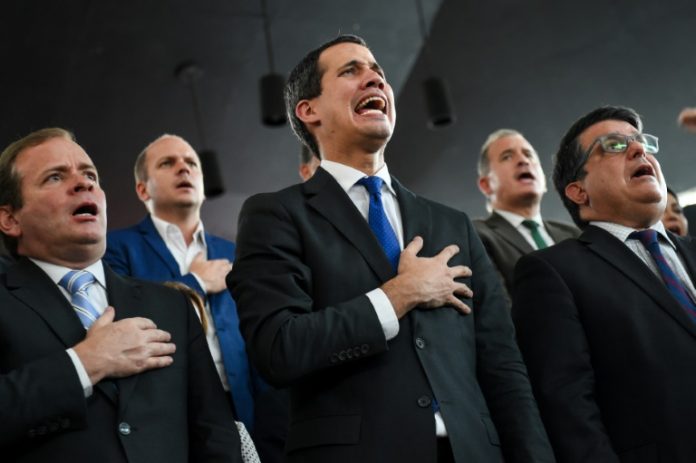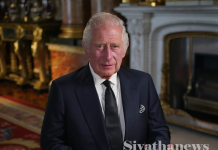Venezuela’s opposition leader Juan Guaido called Tuesday for three days of protests against President Nicolas Maduro, hours after he was sworn in for another term as National Assembly speaker following a standoff with the armed forces.
Guaido was barred from entering the assembly by the National Guard for around half an hour in dramatic and chaotic scenes, while a rival claimant to the speaker’s post occupied the chair.
“It’s time to stand up and to stand up with force,” Guaido said later during a press conference.
“We will mobilize for street protests on Thursday and Friday, and on Saturday we will all be in the streets.”
Guaido, self-appointed acting president of Venezuela, leads the opposition to leftist President Nicolas Maduro, who remains in power despite Guaido’s year-long effort to oust the man he calls a “usurper.”
The National Assembly legislature is the only Venezuelan branch of government in opposition hands, and Guaido’s holding of the speaker’s post is an important for continuation of his struggle with Maduro.
Guaido is backed by the United States and more than 50 other countries but, despite Venezuela’s economic collapse, Maduro appears entrenched with crucial support from the armed forces. He is also backed by China, Russia and Cuba.
“Here we are, showing our face,” Guaido said, taking his seat in the assembly.
He accused the rival claimant to the speaker position, Luis Parra, and others of fleeing “like the cowards they are.”
Lawmakers sang the national anthem but electricity to the chamber was cut off, leaving deputies to use tights on their mobile phones.
Guaido then raised his right hand and took the oath of office for another term as leader of the assembly.

Earlier, dozens of National Guard troops wearing helmets and carrying riot shields blocked Guaido from entering the building.
“These are not barracks!” Guaido shouted.
Some of his allies and members of the press were also blocked from getting inside.
The opposition said on Twitter that four lawmakers were injured by “regime minions.”
Inside, Parra, an opposition legislator accused of corruption, was installed in the seat Guaido had occupied for the last year.
By the time Guaido was allowed in, Parra had already left.
On Sunday Parra had declared himself parliament speaker after the armed forces had prevented Guaido from entering the building.
Crisis-hit Venezuela has been in political turmoil since last January when Guaido used his position as speaker to declare himself acting president in a direct challenge to the authority of Maduro.
He declared on Sunday that he was re-elected to his post after holding a legislative session alongside loyal deputies at the offices of a pro-opposition newspaper.

The United States warned on Tuesday it could ramp up sanctions against Venezuela, and Secretary of State Mike Pompeo congratulated Guaido on his re-election.
“The Maduro regime’s campaign of arrests, intimidation and bribery could not derail Venezuelan democracy, nor could its use of military forces to physically bar the National Assembly from accessing the parliament building,” said Pompeo.
Speaking Tuesday on state broadcaster VTV, Maduro called Pompeo a “failed clown” for supporting Guaido, whose swearing in as speaker was “a show.”
Parra was kicked out of his opposition party last month after an online news site accused him of corruption linked to the over-pricing of food imported for the Maduro government.
He remains a deputy and Maduro recognized Parra’s election in a television address on Sunday. But even Maduro’s left-wing allies Argentina and Uruguay have denounced the move.
Before Sunday’s vote, Guaido said the Maduro government had bribed some opposition deputies to vote against him.
The opposition holds 112 of the 167 seats in the assembly.
As well as two claimants to the presidency and the position of assembly speaker, Venezuela has two legislatures.
The National Assembly has been effectively sidelined since 2017, when the Supreme Court, made up of Maduro loyalists, declared it in contempt. The court has since annulled its every decision.
Maduro then controversially set up a Constituent Assembly – also made up exclusively of loyalists – with power to legislate in its place.












